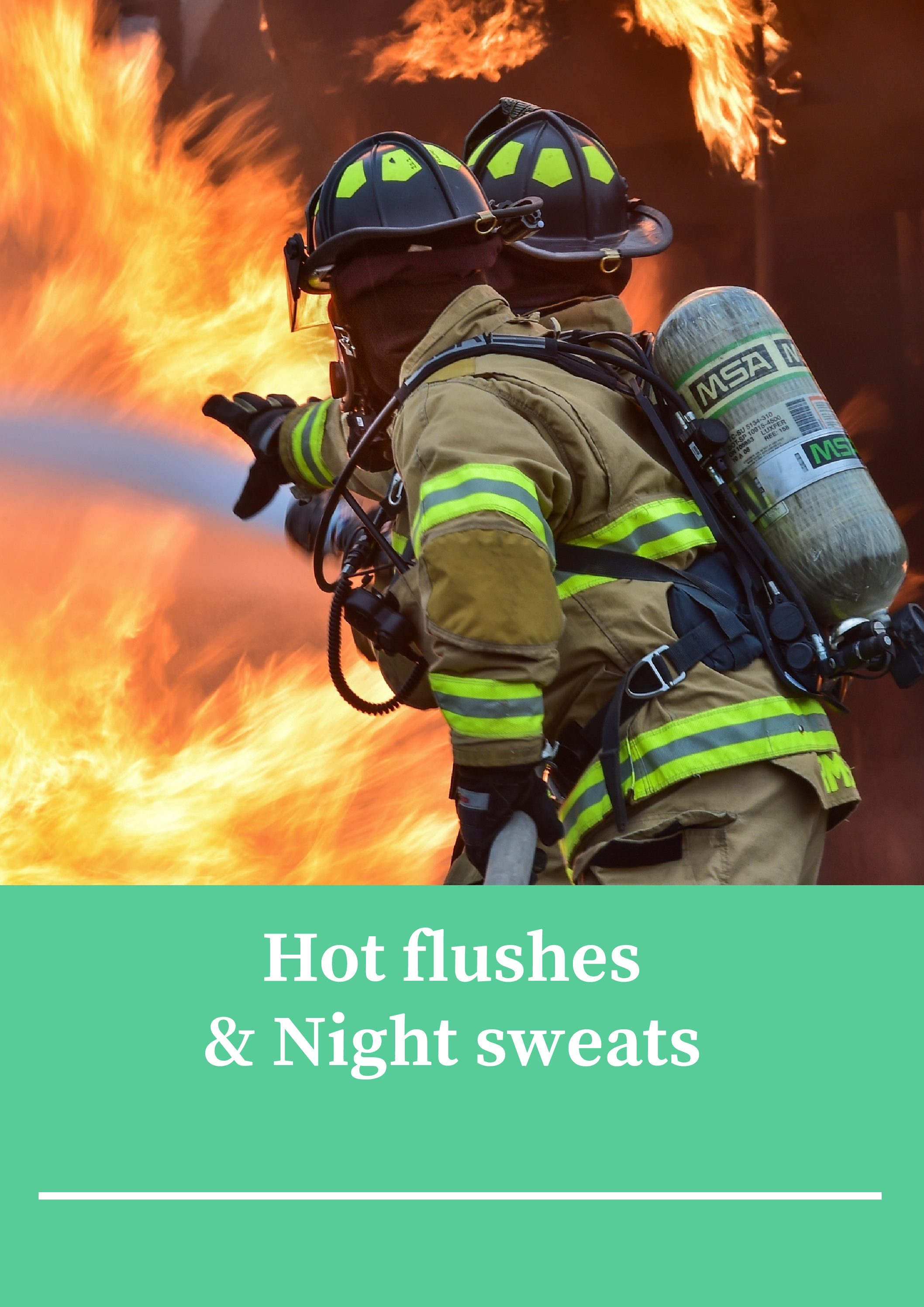Hot flushes and night sweats are probably the classic symptoms that most people associate with menopause. They are often referred to as vasomotor systems.
It is thought that these symptoms are experienced in around 80% of women and that they last for between 4-10 years.
Some women experience a few hot flushes per week and others may experience a few per hour.
Night sweats are the night-time equivalent of hot flushes. You may also find yourself waking up drenched in sweat. Some women have to get up to change their nightwear or even their sheets
Hot flushes typically last from a few seconds to a few minutes throughout the day and night.
They are often felt as a feeling of intense heat to the face, neck and chest. Accompanied by sweating and flushing and for some women an increased heart rate too.
Hot flushes can impair quality of life, disturb sleep, and have a negative effect on mood
Causes
The exact cause of hot flushes and night sweats in peri/menopause is not completely understood. It is now clear is that hot flushes are not solely due to decreased oestrogen levels as previously thought but due to a complex multicausal phenomenon. High cortisol or low cortisol, adrenalin, low progesterone, or low serotonin can all be drivers for hot flashes. Other factors can include being overweight, smoking and your genetics and a history of depression.
In other words, the cause is still unclear but having changing levels of hormones, stress, blood glucose dysregulation may all make hot flushes and night sweats worse.
Over the past few years, new research has linked chronic health conditions with the incidence of hot flushes. These include cardiovascular disease (CVD), osteoporosis, and cognitive impairment are longer-term conditions
Common triggers
Recognising your triggers can be helpful. Here are some of the common ones;
- Hot drinks especially those containing caffeine
- eating spicy foods
- alcohol
- being in a hot room or hot weather
- stress and anxiety
- wearing tight clothing
- smoking or being exposed to cigarette smoke
- bending over
- foods high in sugar
- exercising
What can you do about them?
For quick relief
- dress in layers so that you can remove items of clothing as necessary
- sip some ice-cold water at the start of a hot flush
- wear cotton nightclothes and using cotton bed linens
- keeping a cold pack on your bedside table
- use cooling pads for pillows and beds
- Sleep in a cool room
Diet and lifestyle
- Reducing caffeine, spicy foods, high sugar foods and alcohol (especially wine) intake may help to decrease both the number and severity of hot flushes
- Incorporate plant estrogens into your diet. Plant oestrogens are thought to have weak oestrogen-like effects that may help to reduce hot flushes by providing your body with a weak form of plant-based oestrogen. Examples of plant estrogens include chickpeas, lentils and flaxseeds. Flaxseeds should be eaten in freshly ground form. I buy whole seeds, grind in small amounts and keep them in the fridge. Work up to 2 tbsp daily
- Eat protein with each meal and snack to support blood glucose balance. You may also like to add 1 tsp of cinnamon to your food. This may also help to manage blood glucose balance.
- Try maca root powder daily with breakfast. Start with small amounts though e.g 1/2 tsp as it can be stimulatory for some people
- Acupuncture may be helpful, without the side effects of medication
- Try deep breathing exercises or meditation for stress management. Paced breathing with a five-second inhale, ten-second hold, and five-second exhale may be effective at managing hot flushes
- Reduce weight if necessary
- Choose exercises such as yoga, pilates, strength training and HIIT training which are less likely to raise stress hormone levels
- Take steps towards stopping smoking
Some women find herbal supplement formulas to be effective. However, I would advise working with a practitioner or mention to your GP/doctor so that they can check for any interactions with existing medications.
Hormone replacement therapy (HRT) can be effective for some women but not all, you should discuss this with your GP
One of the reasons you may be offered antidepressants by your GP as some forms of antidepressants have been shown to be effective for the treatment of hot flushes.
There are also other medications that may be offered to women who are unable to take hormone therapies




